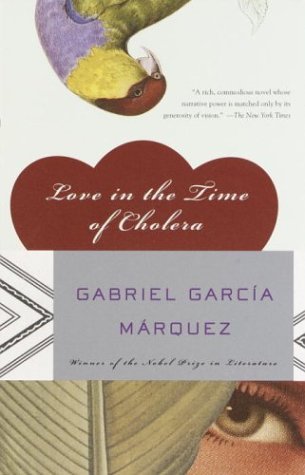 |
| Source: Goodreads |
Gabriel García Márquez (1927-2014)
Translated by Edith Grossman (from Spanish)
Originally 1985, I read Vintage International 2003
348 pages, historical fiction, romance
In their youth, Florentino Ariza and Fermina Daza fell in love through letters and glances. After they meet and Fermina Daza decides that she doesn't love him after all, Florentino Ariza is devastated. He decides to preserve himself and wait for the time when Fermina Daza is available again - when her husband dies.
Florentino Ariza spends decades having affairs, moving upwards in the hierarchy of his uncle's company, and brooding over his continuing love for his childhood sweetheart. Fermina Daza spends decades traveling, raising children, and caring for her husband, a renowned doctor and center of attention in the local high-class society.
When Fermina Daza's husband dies, Florentino Ariza takes advantage of the opportunity that is finally available to him. But how will Fermina Daza, ever the strong and emotional character, react to his reassertion of his love in the wake of her tragedy?
Read a sample or buy from Amazon:
Love and Madness
Florentino Ariza's absolute obsession with Fermina Daza struck me as creepy, not romantic.
What is the basis for Florentino Ariza's love for Fermina Daza? Initially, it was based on her appearance and other external factors. Then, when they began writing to each other, there may have been more depth to it. But without meeting in person and talking, how could they really know each other in the way that is needed? When they finally meet, Fermina Daza realizes that the entire romance was based on an illusion, and I'm sure she's turned off by his overwhelming, obsessive love.
This does not mean that I agree with Fermina Daza's decision to cut off her engagement so suddenly. I thought that was a truly reprehensible act. But on the other hand I understand how Florentino Ariza's intensity would frighten her.
After this initial rejection, Florentino Ariza is given no real closure, no opportunity to discuss it with the one who hurt him. This does leave open wounds that are hard to dismiss. But his continued obsession with his object of desire through half a century struck me as disturbing. In fact, I would even say that he was mentally ill to be fixated on one thing for so many years, passing up his opportunity for a full and happy life in exchange for an obsession.
Living in the future
Florentino Ariza spends decades living in the future, which is problematic on many levels. Besides the questions it raises about his mental state, it makes him treat his other women as simply temporary things to be used. They will be immediately rejected when his love's real object is again available. The consequences of this attitude are made explicit at the end of the novel, when one of his other lovers commits suicide after he casually rejects her.
His whole life is a waiting game. Everything he does is just to pass the time, and nothing makes him truly happy. This is a terrible way to live. Fermina Daza, on the other hand, has a full and relatively happy marriage, complete with children and traveling. While she does not think that she loves her husband, per se, she also doesn't know if she ever loved (or could love) Florentino Ariza. It seems to me that Fermina Daza, like many people, has an unrealistic expectation of what love would be like that makes her unsatisfied with whatever she has. Still, her life is full of things that she enjoys, which is a more fulfilling life (in my opinion) than Florentino Ariza's.
His whole life is a waiting game. Everything he does is just to pass the time, and nothing makes him truly happy. This is a terrible way to live. Fermina Daza, on the other hand, has a full and relatively happy marriage, complete with children and traveling. While she does not think that she loves her husband, per se, she also doesn't know if she ever loved (or could love) Florentino Ariza. It seems to me that Fermina Daza, like many people, has an unrealistic expectation of what love would be like that makes her unsatisfied with whatever she has. Still, her life is full of things that she enjoys, which is a more fulfilling life (in my opinion) than Florentino Ariza's.
Overall, I did not enjoy this book as much as I had expected to. I would not call it "the greatest love story ever told," as it is described in the movie trailer.
It would be much better described as a character study of a man who is far too obsessed with his childhood sweetheart after they break up.
I did like the writing style, and I look forward to reading some of Gabriel García Márquez's other stories. This one, unfortunately, fell flat.
Where I found it: Half Price Books, Hamilton, OH, USA
Further Reading:
10 Short Stories and more by Gabriel Garcia Marquez, courtesy of Open Culture
No comments:
Post a Comment